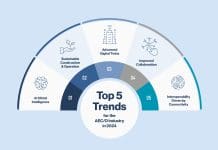Construction employers, decision-makers, educators and students are appealing to the government to tackle the construction technology skills gap and safeguard the future of the trades industry
On 3rd March 2022, construction minister Lee Rowley and more than 30 employers attended Moulton College’s Construction Future Skills exhibition and workshop in Northamptonshire, to address the construction technology skills shortage facing the industry.
The solutions they came up with included asking the government to facilitate better on-the-job training, which could be achieved through better work experience opportunities and technology-focused apprenticeships. Other suggestions such as improving flow of learning between schools, colleges and employers, better integration of education and industry, and emphasis on learning lifelong skills were also discussed.
The construction Future Skills event presented ways to tackle the construction technology skills gap
Moulton College’s Construction Future Skills event was supported by Constructing Excellence (CE) Midlands and the National Federation of Builders (NFB). The exhibition space showcased new technologies and illustrated how AI, automation, robotics, and other technologies are impacting the industry.
It also ran a workshop that explored the ways that the industry can establish the hard and soft skills construction needs for the future so that the sector can bridge the the construction technology skills gap. Attendees were encouraged to debate, share experiences, and network. Its findings will be delivered via a report to guide industry, education and government in driving change.
Exhibitors included:
- 360safeVR’s immersive film and behavioural change programme
- Software-as-a-Service platform for Building Information Modelling 3D Repo
- KOREC Construction’s mixed reality headset and augmented reality solution
- Flannery Plant’s plant simulator
- digital construction solution Oculo
- geo-spatial technology specialists Ridge & Partners

A new learning culture: soft skills, hard skills and lifelong learning were all emphasised as key routes to improving skills
Mark Wakeford, Moulton college governor and joint managing director of Stepnell Ltd, said
“I was really pleased to hear lively discussion around our sector’s future training requirements, common ground among delegates, as well as openness and honesty in sharing their own experiences and progression.
“Current students were keen to learn the hard skills they need to succeed in a construction career, while industry leaders highlighted the soft skills also needed to complement these, which will ensure new entrants add well-rounded value.
“Industry leaders emphasised the importance of lifelong learning – ever-more important in the fast-changing world of our construction industry. However, it is clear challenges with courses and awarding bodies remain to be resolved.”
The construction industry is adapting and improving to address the skills shortage
Construction minister Lee Rowley added:
“It’s been fantastic to meet some of the young people looking to make construction their career and see their enthusiasm for seeing first-hand the technology paving the way for the future of this industry.
“These students could be tomorrow’s leaders of the change we are all trying to enact, so it was truly inspiring to hear some of the discussions, ideas, and creativity from them, as well as industry innovators driving construction forward.
“It’s so very important that all voices across the sector are heard, and that we come together to provide the right opportunities, education, and inspiration to the next generation to make a real difference to the way we build and achieve our goals of increased sustainability and innovation.”
Moulton college principal & CEO Corrie Harris said:
“Our construction industry is always adapting and improving and is embracing innovation faster than ever. At Moulton College, we are in a privileged position to help nurture and grow the sector’s talent coming through, while also speaking to employers regularly about what their current and future skills needs are – so today has been a unique way to bring those two groups together.”

















